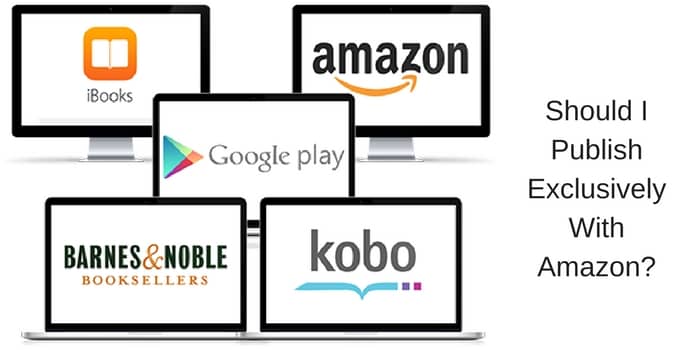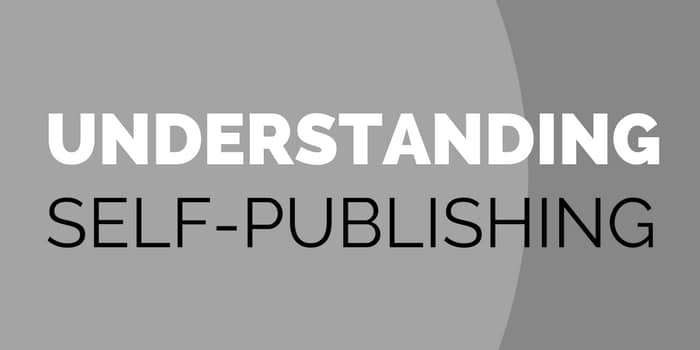 It’s a tough decision to publish exclusively.
It’s a tough decision to publish exclusively.
I have been self-publishing for a very long time, well before the introduction of the Amazon Kindle in 2007, so I think I have been around the block a few times.
Over the years, and particularly during the last eight years, I have have had a love-hate relationship with Amazon, and in particular with their policy of demanding that you publish exclusively for enrolment in its KDP Select program.
While I have been a firm believer in making my books, and ebooks more precisely, available for readers on all platforms, the last couple of years have been disappointing, as I think my faith has been misplaced. I truly believed that alternative platforms, retailers and aggregators were always poised to challenge Amazon with new ideas, new thinking and new ways of exploiting the ebook market.
Sadly though, the only innovator in town has been Amazon. Sure, some of their innovations have drawn criticism, such as KDPS and Kindle Unlimited, but at least they are trying new ideas.
The biggest hope I held was for Smashwords. Ok, they are an aggregator, but after Amazon, they are the next biggest ebook seller. But for some reason, although signing up new retailers such as Oyster and Flipkart, nothing much has changed over the last few of years. Yes, they supply Apple and Barnes & Noble, but neither of these big ebook retailers has done much to enthuse self-publishers. In fact, I would say, both have their feet stuck firmly in cement, as they have done absolutely nothing new in years. Same-o-same-o does not work in today’s ebook or technology market.
Even with potentially great retailers and platforms, ebook sales via Smashwords are still way behind Amazon. Another handicap is that getting an ebook approved on Smashwords is still a total pain in the butt. Nothing has changed in this regard in years!
Then there is Google Play Books. Well, let’s just forget about them. It is as if Google really wants this to fail, as it is an absolutely horrific platform to publish with and sales are next to non-existent. Then there is their weird pricing model, which discounts every damn ebook! Why? Who knows? But it plays merry hell with Amazon Price Matching.
So my real dilemma is this. Why should I bother keeping three different file versions of my ebooks as Amazon, Smashwords and Google all require different file types or disclaimers to suit their legal and technical requirements? It’s a nightmare making sure every version is up to date. If I publish exclusively it will be far simpler.
Wouldn’t it be far easier for me to finally admit that there is only one real ebook innovator in town? In fact, only one ebook seller in town.
So, is it wrong to think about finally throwing in the towel and saying enough is enough of trying to play fair for all? And if I do decide to ditch the rest and only publish my ebooks with Amazon, then exclusivity becomes a non-issue.
And so does keeping so many versions of my ebooks!




Over the years I’ve known you, I’ve always wondered why you constantly vacillated between Amazon and Smashwords, unlike myself. As for the exclusivity thing, the very fact that all the others you mention, aren’t worth a damn sales wise, tends to make a nonsense of objecting to it surely?
Do what I did, chose one and stick with them. For me that’s KDP(Amazon).
:)
Perhaps you’re right, Jack. I’ve have probably been an idealist for far too long. Time to bring out the pragmatist!
I feel the same way. I published my first couple of books of The Minstrel’s Tale Trilogy and aside from a few sales I could count on one hand from iTunes and Barnes & Noble, all of my sales came from Amazon. When tbey offered KDP unlimited, I didn’t hesitate.
When my new book, Pangaea, came out in January, I considered offering it through Smashwords, but decided to stay with Amazon exclusively and skip the hassle. Besides, with the Kindle ap, it’s not like iPhone/iPad/android users are missing out at all.
You’re right Anna. It’s a lot of hassle for just a handful of book sales on Apple and B&N.
What do you think of Amazon just recently adding $6 million (increasing to a total of over $9 million) to their KDP select for March?
@Derek,
Like you I have self-published for a long time (since 1988) and therefore I am grateful to Amazon for making self-publishing easy for indie authors. However, I find it difficult to wrap my head around the concept that indie authors are supposed to buy ads at Bookbub to give away their book for free. Without that (financial) effort of about ~$500, KDP Select is not working very well.
Here is what I have found out. If your book could be appealing/ interesting/ important for the Indian market you probably should stay with Smashword/flipkart. Indian readers favor (!!!) flipkart. To get my foot into the Indian market I actively sought reviews by Indian book reviewers. Following these reviews I have been able to sell quite a few copies of three of my books at flipkart and Amazon.in.
My only words of caution:
1) It takes time!
2) Do not ship paperbacks (My books always received reviews when I shipped ebooks. but never received reviews when I shipped paperbacks )
Lastly: It is my experience that when I occasionally drop my books’ price to 99 cents, I sell more books than I used to sell after “the famous free 5 days”, plus my books receive more reviews, because the buyers really want to buy and don’t just “grab”.
I hope you’ll befriend me on one of the social media platform (links are on my webpage)
Good luck, Gisela
Thanks for your comment, Gisela. I feel the same as you about paying Bookbub to give away ebooks. Insane! But in certain circumstances, Bookbub is good value. They have over 4 million on their mailing list, so it is a resource worth paying for, but only for very select promotions.
I must admit, I haven’t really looked at the Indian market, but clearly I should. Are Flipkart doing better than Kindle in India?
@Derek
Indians are voracious readers – they also write very good book reviews.
I don’t want to say that Flipkart is outdoing Amazon, but there is a clear divide. Readers favor the one or other platform (e.g. many Indian authors favor Amazon for obvious reasons) and you won’t get the ones ,who may be patriotic (Flipkart is an Indian corporation), who can’t afford a Kindle, who already have a flipkart account, and many more reasons to buy your book on Amazon, free or not. There are patterns but I haven’t been able to figure all of them out.
The only thing I am certain is: Do NOT send paperback copies to India.
I have sold book at Amazon.in and Flipkart.
Indian readers have sent me emails, thanking me, that I put my books on Flipkart.
I have never received a book review on Flipkart.
I have received book reviews on Amazon.in.
Whatever the rules, the Indian market is too big to be overlooked.
What do you think of the new Kindle Scout program Amazon is promoting?
Actually, I don’t think much of Kindle Scout at all, as it is only available to US authors. I wrote a post about it a little while back, as it is extremely unfair to exclude non-US authors from the opportunity. Hopefully, Amazon will change their mind.
I gave up on Smashwords. They never worked for me. Amazon works far better. The only things I like about Smashwords are the coupon generator, and the fact that you can set your price to permafree if you want. Pity Amazon dont allow this flexability.
In his talk at IndieRecon this year, Mark Coker (of Smashwords) pointing something out that I’d never thought of before, but which I agree with wholeheartedly, now that I have.
Amazon has a clear mission, and that is to put every other e-book retailer on the planet, out of business.
Amazon is in the unique position that, unlike other e-book retailers (Kobo, B&N, etc), they do not need to make a profit on their e-book business, and can continue to support it using their other stores, pretty much in perpetuity.
Every book published exclusively at Amazon draws readers AWAY from other e-book retailers, and brings Amazon closer to their ultimate goal of putting all other e-book retailers out of business.
If this were to happen, it would be very bad for the industry at large. As an author, you WANT retailers to be able to make a profit selling books, so that they can continue to prosper by selling books, and thereby stay in business.
I agree with Mark Coker’s sentiment to an extent, Graham, but should authors forego their own sales and income for an ideal to support businesses that haven’t yet found a way to complete? Mark’s argument is understandable, because he must support his own business. But the business world isn’t always fair, or a level playing field. Right now, I think self published authors have their own income as their primary concern, and Amazon offer the best opportunity. Fair? Maybe not, but that’s business.
“I think self published authors have their own income as their primary concern, and Amazon offer the best opportunity. ”
Why do you think sales on Amazon would be affected if you’re also on other networks? For the discount days? That’s it? Use BookBub: you’ll sell your titles as if there’s no tomorrow.
The article reads outdated. You don’t need to have multiple file versions for the various distributor. One is enough.
What you really want is to upload yourself to KDP so you have the dashboard, and to Smashword for the Premium catalogue and wide distribution. I sell daily and in the hundreds per month on both Amazon and Barnes&Noble + iTunes.
This part of life is not at all complicated.
PS
Once you get a manuscript ready for Smashwords, you have a template valid for all subsequent books. Really, it’s not particle physics.
PS
Last cheque from Smashwords was over $400. Why on Earth should I give that up? Besides, with Smashwords is a breeze to do giveaways and promotions for all your titles, and it is the only way to have Amazon have one of your book (let’s say #1 of a series) as a perma-free to capture more readers.
I have to disagree, Massimo. Smashwords require a different licence note, they only accept .doc files, and do not allow for font sizes above 18pt. While Amazon accept .docx files, which are far better suited to ebook conversions as they are .xml files. Also, to add links to your other books, this is not permitted with Smashwords, but with KDP, links can be added. These are just a few of the differences, and why it is necessary to prepare specific versions for each platform.
Sure, a Smashwords file can be used on KDP no problem, but it is not ideal for KDP, and it can’t be used for Google Play because Google only accept .docx files.
Not anymore. I have my books on Smashwords and the grinder does not require the special “Smashword edition” not as an additional copyright page.
As I said, and as a fact, my Amazon files are the same as the Smashwords files.
Concerning links, you mean that Amazon accepts links to your other Amazon titles? :) Of course!
You can have links on Smashwords for as long as they do not point to a specific vendor, which is obvious. Why iTunes should accept a link to Amazon in the eBook sold on iTunes.
If you have your books with links everywhere to Amazon, no vendor will accept to sell that for you. It’s not a policy of Smashwords, it’s a policy of selling books on multiple vendors.
And what is the technical difficult you have to have a master .docx and then save it as .doc ? ;)
Besides, you can also upload ePub on Smashwords, and Kindle on Amazon which is actually the best method of any because you have exactly the control of what you will present your readers and not using a bloated word document (whatever format). ;)